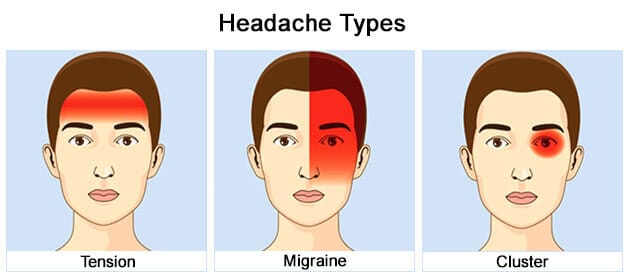Migraines vs. tension headaches
Tension headaches and migraines may cause very similar symptoms. Migraine symptoms tend to be more severe than tension headaches.
With a tension headache, your pain is usually mild to moderate throughout your head and disappears within a few hours. Migraines tend to last longer and are often debilitating.
Tension headaches don’t typically cause any visual side effects like an aura or physical side effects like nausea or vomiting. Tension headaches can make you feel sensitive to light or sound but usually not both.
Sinus headaches are often confused for migraines because they share many symptoms, including pressure in the sinuses and watery eyes. Sinus headaches are usually only moderately painful and can be treated with sinus treatments or other allergy medications.
Migraines vs. cluster headaches
Cluster headaches differ from migraines mainly in that they follow patterns of occurrence. They “cluster” together, in short, episodic attacks during a period of weeks or months. Sometimes, an entire year can pass between two headache clusters. Migraines tend not to follow this kind of pattern.
Symptoms of migraines and cluster headaches are similar. In both cases, pain is severe. Cluster headaches can cause many distinct symptoms that migraines don’t cause, including:
- red, bloodshot eyes
- swelling of the eyelids (edema)
- shrinking of the pupil (miosis)
- runny nose or congestion
- drooping of the eyelids (ptosis)
- agitation, annoyance, or restlessness during a headache
RELATED: What Causes Chronic Migraine and Migraine?
If you observe any of these symptoms during a severe headache, you’re likely experiencing a cluster headache, not a migraine. Your doctor can usually diagnose cluster headaches by examining the nerves in your eye or discovering an abnormality during MRI scans linked to cluster headaches. Talk to your doctor about getting checked for cluster headaches if you have these symptoms.
Relief and treatment
Medications for pain relief may be enough to treat your symptoms. Common pain relievers that can help migraine symptoms include:
- ibuprofen
- aspirin
- acetaminophen (Tylenol)
- Excedrin (aspirin, acetaminophen, and caffeine)
Migraine prevention
If you have at least six migraines per month or three migraines a month that severely interfere with your daily life, your doctor may recommend preventive medications that are effective against migraine symptoms, including:
- beta-blockers, such as propranolol or timolol, for high blood pressure or coronary diseases
- calcium channel blockers, such as verapamil, for high blood pressure
- tricyclic antidepressants, such as amitriptyline, for controlling serotonin and other chemicals in your brain
- antiseizure drugs, such as valproate (in moderate doses)
- pain relievers, such as naproxen
- CGRP antagonists, a new class of drugs approved to prevent migraines
There can be side effects of these medications. Also, talk to your doctor about lifestyle changes that can help decrease migraines. Things like quitting smoking, getting plenty of sleep, avoiding triggers from certain foods, and staying hydrated can be useful.
Some alternative medicines are often used to aid in relieving migraine symptoms, including:
- acupuncture
- cognitive behavioral therapy, a type of therapy that instructs you on how your behavior and thinking can change the way you perceive your migraine pain
- herbs, such as feverfew
- riboflavin (B-2)
- magnesium supplements (if you have low levels of magnesium in your body)
Your doctor may recommend that you try these alternative options if medicinal treatments aren’t working for you or if you want to take greater control of preventive care for your migraines.
RELATED: Essential Oils for Headaches and Migraine Attacks
Migraines in children and teens
Teens are also more likely to have chronic migraine (CM), which causes migraines for several hours a day for over 15 days of the month across three or more months. CM may cause your child to miss school or social activities.
Migraines can be passed on genetically. If you or your child’s other biological parent has a history of migraines, your child has a 50 percent chance of having them. If both you and the other parent have a migraine history, your child has a 75 percent chance. Plus, many things can trigger your child’s migraines, including:
- stress
- caffeine
- medications, including birth control and asthma treatment
- routine changes
Find out what’s causing your child’s migraine, then talk to your doctor about the best way to treat and prevent migraines. In addition to medications, your doctor may recommend relaxation techniques and preventive therapy so that your child can better understand and manage their migraines.
Migraine pain can be severe, and often unbearable. Depression is more likely to occur in those who experience migraines than in those who do not. Medications and other treatments are available to reduce the frequency and severity of your migraines.
If you regularly get migraines, make an appointment with your doctor to discuss your symptoms and a treatment plan.


